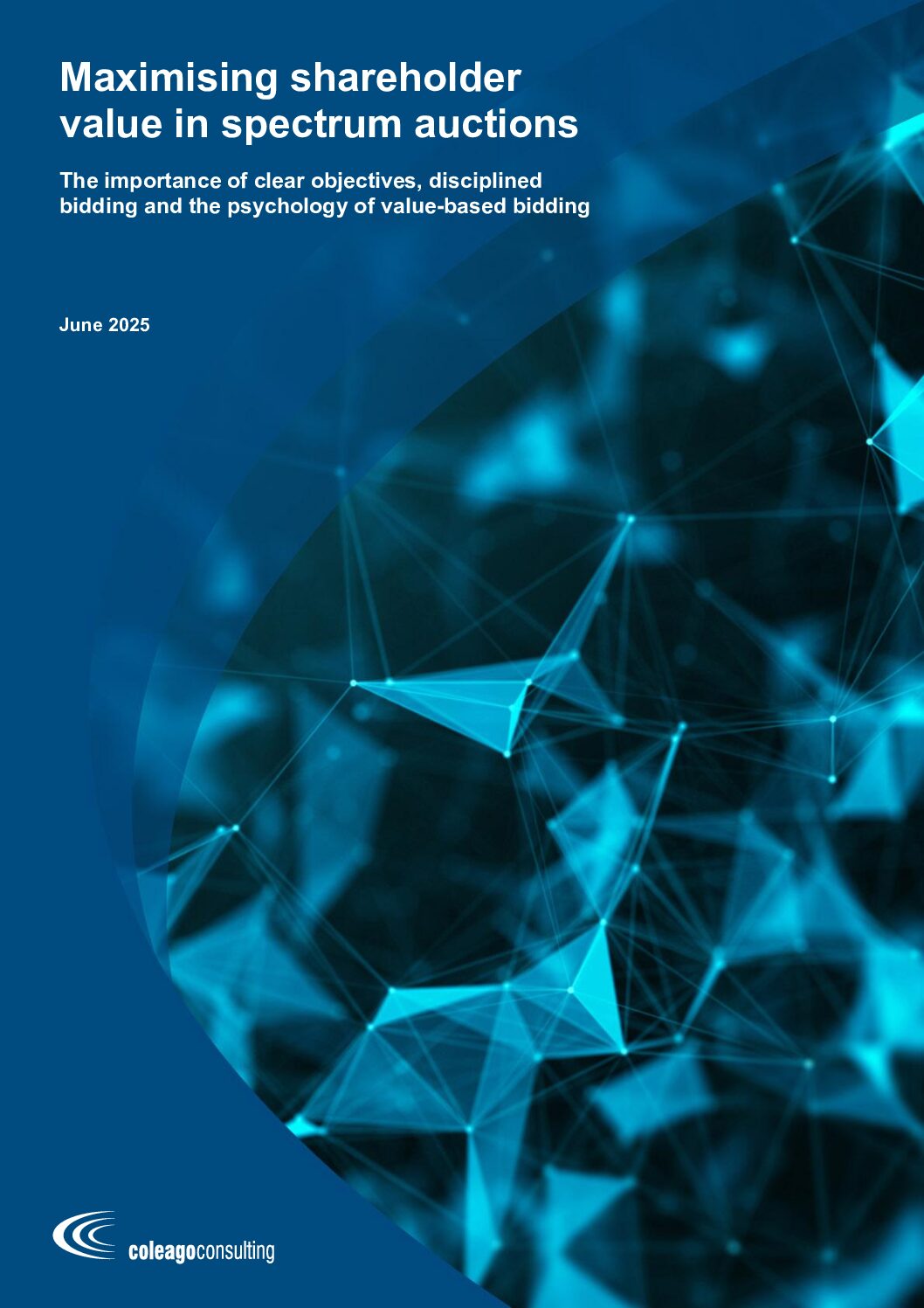Maximising Shareholder Value in Spectrum Auctions
Spectrum auctions, while common in the telecom industry, are complex and high-risk events that can significantly influence a company’s long-term performance. Missteps, especially vague auction objectives and poor valuation discipline, can lead to substantial destruction of shareholder value.
This paper provides a strategic framework for mobile operators to approach spectrum auctions in a way that safeguards and enhances shareholder value.

Key Takeaways
Clear Auction Objectives Are Critical
Auction strategies must be anchored in clearly defined objectives. Ambiguous goals such as “acquire the most spectrum within budget” or “win the most valuable block” can mislead bidding teams and result in overpayment or inefficient allocation of capital. Objectives should focus strictly on value creation, aligning with the overarching responsibility to maximise shareholder returns.
Shareholder Value as the Guiding Principle
The paper underscores that all auction decisions should be based on shareholder value maximisation. This involves calculating the economic value of each spectrum block and only bidding when the expected value exceeds the cost. Under budget constraints, the focus should shift to acquiring the highest value per dollar spent.
Confidence in Spectrum Valuations Is Essential
Valuation exercises must be robust and finalised before the auction begins. Operators should treat spectrum blocks as equivalent to monetary assets, enabling rational and objective bidding. Re-evaluating spectrum values mid-auction can lead to strategic errors due to auction design constraints.
Psychological Discipline Is a Success Factor
Auctions are psychologically intense. Bid team leaders must possess discipline and detachment, not the competitive drive to “win.” Emotional bidding can result in irrational price escalation, eroding potential value. Teams must be well-trained, with predefined protocols and escalation procedures.
Flawless Execution and Security
Beyond strategy, execution, including people, tools, and protocols, is vital. Roles must be clearly assigned, procedures rehearsed and decision-making processes insulated against groupthink. Additionally, maintaining strict information security around bid limits and valuations is imperative to prevent competitive disadvantages.
Contingency Planning
Given the reliance on digital auction platforms, operators must have robust IT infrastructure, backup systems and disaster recovery plans, including physical relocation strategies in extreme scenarios.
Conclusion
To succeed in spectrum auctions, mobile operators must combine rigorous valuation, clear value-based objectives, disciplined leadership, robust execution and strong security. These elements collectively ensure that auction participation enhances rather than diminishes shareholder value.
Coleago Consulting brings over two decades of experience in supporting operators through the spectrum auction process, from valuation to strategy execution.
Other insights

Navigating Spectrum Licence Renewal: Lessons from Australia
Australia’s spectrum licence renewal process shows how operators can align regulatory engagement with commercial strategy. This case study highlights Coleago’s role in helping Optus secure optimal outcomes, from evidence-based submissions to spectrum planning for 5G and 6G.

Tanzania’s 3.6 GHz Spectrum Auction: Key Insights and Lessons for Future 5G Awards
Tanzania’s recent 3.6 GHz spectrum auction marks a major step toward 5G, but its design choices raise important questions about efficiency and fairness. Coleago’s latest white paper reviews the TCRA auction and shares key lessons for regulators and operators shaping future 5G spectrum awards.

Implications of a Full Transition from DTT to IPTV in the UK by 2035
In May this year, Coleago published a report prepared for the UK Spectrum Policy Forum which provides a technical and strategic assessment of future options for use of the UHF band (470–694 MHz) in the United Kingdom beyond 2034.

The European 5G Fairytale
For years, European policymakers and telecom operators have touted the impressive figure: “89% 5G coverage of populated areas.” On paper, this paints a picture of near-ubiquitous, high-speed connectivity. Scratch the surface however, and the reality looks quite different.

Spectrum and Regulatory Challenges Related to eVTOLS
Electric Vertical Take-Off and Landing (eVTOL) aircraft are poised to revolutionise urban mobility, with commercial operations expected to begin as early as 2025 and significant growth anticipated by the 2030s.

Future of the UHF Band after 2024: An Analysis of Options in the UK
Coleago Consulting in collaboration with its client, the UK Spectrum Policy Forum, has released a landmark report, “Future of the UHF Band After 2034,” setting out a detailed assessment of the United Kingdom’s Ultra High Frequency (UHF) spectrum landscape. The report looks at the industry trends and the critical trade-offs required to balance the needs of Digital Terrestrial Television (DTT), Mobile Communications, and Programme Making and Special Events (PMSE).